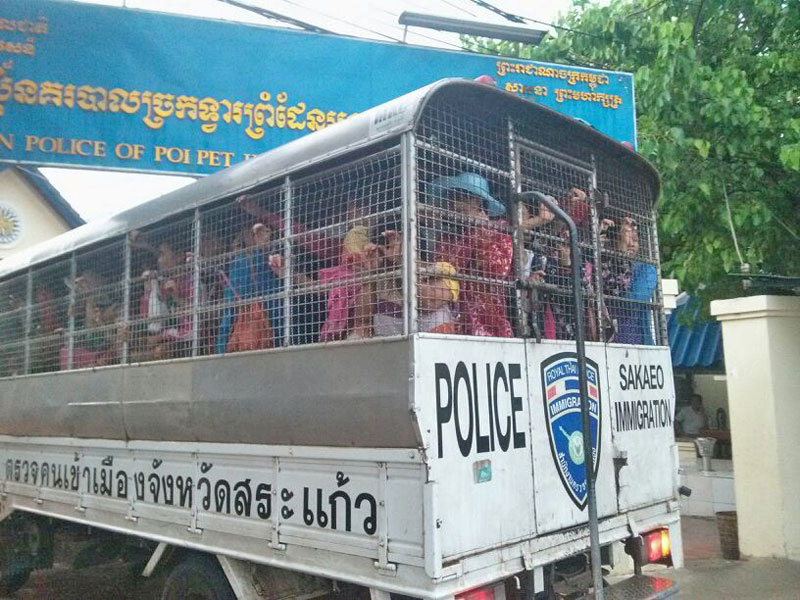Hundreds of fearful and confused Cambodian migrant workers—including those with legal documentation—are continuing to flee Thailand, workers said on Tuesday, even as both the Cambodian and Thai governments called for calm among the migrant workforce.
Thailand passed new laws late last month enacting harsher punishments for foreigners who work in the country illegally as well as for those who hire them, leading to widespread panic and a mass exodus as authorities began arresting and deporting illegal migrant workers.

In an attempt to calm the situation, the Thai government on Friday announced a 120-day grace period—which appeared to fail to stem the tide—before declaring a further extension on Tuesday.
Kissana Phatanacharoen, deputy spokesman for the Thai National Police, said the grace period would likely last until “sometime next year” and claimed that enforcement of the new laws had stopped within the past week.
“We have just talked to the employers about the regulations and their responsibilities,” he said.
Mr. Phatanacharoen said Cambodian workers had not been deported.
“What is happening is the workers are talking to family back home and deciding to return,” he said.
“Don’t panic,” he added.
Despite these reassurances, even those with the correct paperwork have fled or are hiding in fear, said Van Sovoan, who said he was forced by a Thai recruitment agency to resign from his job at a manufacturing factory in Thailand’s southern Saraburi province last month, even though he had the correct paperwork.
“I have a passport and visa, but I am afraid that Thai police might arrest me because I couldn’t find a job” after leaving his last one, he said.
Kim Thea, Mr. Sovoan’s former co-worker and a Cambodian union activist, said fear and confusion had caused compatriots to leave Thailand.
“A few people have returned to Cambodia [even though] they have legal documents,” she said.
Ms. Thea said she had requested that her factory employer return relevant legal documents to the remaining Cambodian workers so that they could feel secure when police approached them.
Though Cambodians are still returning in droves, a migration monitor has recorded decreasing numbers. After Saturday’s peak of 911, 736 Cambodians returned on Sunday and 611 on Monday, according to International Organization for Migration (IOM) program manager Troy Dooley, who said the figures had spiked on June 26, three days after the new legislation had passed, from under 200 to 650.
Khun Tharo, a project coordinator at Building and Wood Workers’ International, a global union federation, said migrant workers who stayed in Thailand could be at risk of being subjected to extortion attempts.
“We are really concerned if the authorities are searching for those undocumented workers, and the agencies and the companies are hiding those undocumented workers, it means they are trapped and exploited,” he said, explaining that employers could take advantage of the workers’ fear of arrest and extort them in return for protection.
He also said that undocumented workers were vulnerable to local authorities’ corruption and demands for bribes, saying he had been told of some being forced to pay $300 to $400.
When workers cannot afford the bribe, they are trapped into staying and working to pay it off, he added.
Dy Thehoya, program officer at labor rights group Central, said the Cambodian government needed to “set up mechanisms” to help the exodus of migrant workers return to Thailand legally.
“The government has to talk to recruitment agencies to set up an international standard of $250 for the whole process. And it should not take longer than three months,” he said.
Mr. Thehoya said the often-lengthy process pushed some into debt.
“The longer it takes, the more it increases the interest, the debt, and workers have to borrow from microfinance institutions,” he said.
He said workers were deterred by the long wait combined with the cost of recruitment services of about $800 per person on average.
Labor Ministry spokesman Heng Sour did not respond to requests for comment about the recommendations on lowering prices. On Monday, however, he suggested that returning workers register with national employment agencies for jobs in Cambodia or use recruitment agencies to return to Thailand legally.
A ministry delegation is due to visit Thailand on Thursday to discuss the process of legalizing workers.



